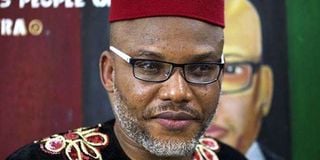Premium
Embattled secessionist leader Nnamdi Kanu denies treason charges

Nigeria’s Nnamdi Kanu, the fugitive secessionist leader of the proscribed Indigenous People of Biafra.
Nnamdi Kanu, the embattled leader of the proscribed Indigenous People of Biafra (IPOB), a South East Nigeria secessionist group, has pleaded not guilty to treason charges.
Kanu, who was brought in under tight security on Thursday, was arraigned at the Federal High Court in Abuja. He was guarded by army, police and civil defence corps officers.
The secessionist leader, who was captured in June after he fled Nigeria in 2017, is facing seven counts including terrorism.
He pleaded not guilty at the court presided over by Justice Binta Nyanko, who declined his request to be transferred to Kuje correctional centre from the custody of Nigeria's secret police, the Department of State Service (DSS).
The court, however, granted that three persons of Kanu’s choice could pay him a visit at the DSS facility where he is being held.
The court thereafter adjourned to November 10 for hearing of his application challenging the competence of the lawsuit.
The secret police kept all journalists out of the courtroom, citing "orders from above". Mr Ifeanyi Ejiofor, lead counsel for Kanu, posted pictures of them together in the courtroom.
The Nigerian government recently amended the charges against Kanu, who is also a British citizen, increasing them from five to seven counts.
According to the state, the secessionist leader, on diverse dates between 2014 and 2015 in London, did a broadcast on Radio Biafra calling for secession from Nigeria with a view to creating the Republic of Biafra.
He is accused of using the illegal radio to refer to President Muhammadu Buhari as a paedophile, terrorist, idiot and an embodiment of evil, knowing the same to be false.
Kanu is also accused of importing a radio transmitter known as TRAM 50L that was concealed in a container declared as used household items. Additionally, he is accused of professing to be the leader of IPOB, which Nigeria terms as a terror organisation.
He is also accused of act of terrorism after allegedly directing IPOB members to kill security personnel and their family members.
Kanu had accused Kenya of being an accessory to his abduction and subsequent deportation to Nigeria, an allegation that East African country had denied.
If found guilty, Kanu could be sentenced to life in prison.





